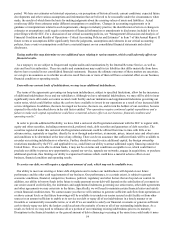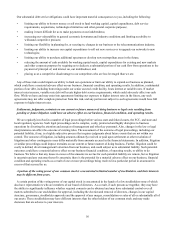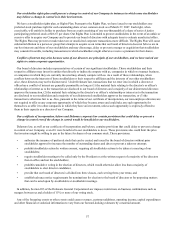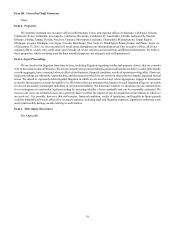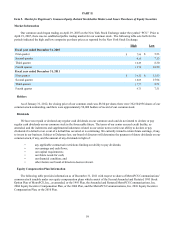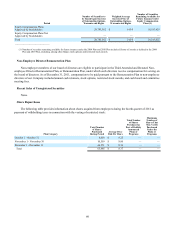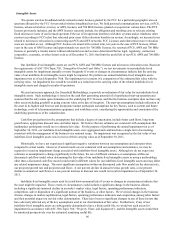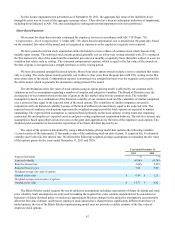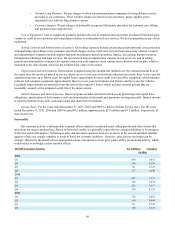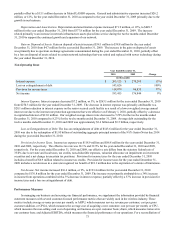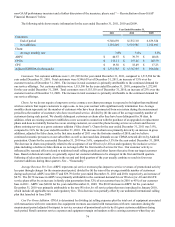Metro PCS 2011 Annual Report Download - page 75
Download and view the complete annual report
Please find page 75 of the 2011 Metro PCS annual report below. You can navigate through the pages in the report by either clicking on the pages listed below, or by using the keyword search tool below to find specific information within the annual report.64
assumptions or conditions.
We believe the following critical accounting policies affect our more significant judgments and estimates used in the
preparation of our consolidated financial statements.
Revenue Recognition
Our wireless services are provided on a month-to-month basis and are paid in advance. We recognize revenues from
wireless services as they are rendered. Amounts received in advance are recorded as deferred revenue. Suspending service for
non-payment is known as hotlining. We do not recognize revenue on hotlined customers.
Revenues and related costs from the sale of accessories are recognized at the point of sale. The cost of handsets sold to
indirect retailers are included in deferred charges until they are sold to and activated by customers. Amounts billed to indirect
retailers for handsets are recorded as accounts receivable and deferred revenue upon shipment by us and are recognized as
equipment revenues and related costs when service is activated by customers.
Our customers have the right to return handsets within a specified time or within a certain amount of use, whichever
occurs first. We record an estimate for returns as contra-revenue at the time of recognizing revenue. Our assessment of
estimated returns is based on historical return rates. If our customers' actual returns are not consistent with our estimates of their
returns, revenues may be different than initially recorded. Our reserves for returns were not significant as of December 31,
2010 or 2011.
We have revenue arrangements with multiple deliverables and follow the provisions of Financial Accounting Standards
Board, or FASB, Accounting Standards Update No. 2009-13 "Multiple-Deliverable Revenue Arrangements," or ASU 2009-13.
ASU 2009-13 which amended the methodology upon which companies allocated revenue within arrangements with multiple
deliverables under Accounting Standards Codification, or ASC, 605, (Topic 605, “Revenue Recognition”), allowing for
allocation based upon a selling price hierarchy that permits the use of an estimated selling price to determine the allocation of
arrangement consideration to a deliverable in a multiple-deliverable arrangement where neither vendor specific objective
evidence nor third-party evidence is available for that deliverable, eliminating the residual method.
We have determined that the sale of wireless services through our direct and indirect sales channels with an
accompanying handset constitutes a revenue arrangement with multiple deliverables. We divide these arrangements into
separate units of accounting, and allocate the consideration between the handset and the wireless service. Under the amended
provisions of ASU 2009-13, the amount allocable to the delivered unit or units of accounting is limited to the amount that is not
contingent upon the delivery of additional items or meeting other specific performance conditions, or the non-contingent
amount. We have considered our customer service policies and historical practices and concluded that the amount of
consideration received related to service revenue is contingent upon delivery of the wireless service as the customer may
receive a service credit if we did not deliver the service. Any remaining consideration received is recognized as equipment
revenue when the handset is delivered and accepted by the customer as it represents the non-contingent amount. Delivery of the
wireless service generally occurs over the one month period following delivery and acceptance of the equipment by the
customer as we do not require our customers to enter into long-term contracts. The value allocable to the undelivered wireless
service element is based on the monthly service amounts charged to customers in the months following their initial month of
service.
Allowance for Uncollectible Accounts Receivable
We maintain allowances for uncollectible accounts for estimated losses resulting from the inability of our independent
retailers to pay for equipment purchases, for amounts estimated to be uncollectible from other carriers for intercarrier
compensation and for amounts estimated to be uncollectible from customers with mid-cycle plan changes where service has
been provided prior to the receipt of payment based on billing terms. We estimate allowances for uncollectible accounts from
independent retailers based on the length of time the receivables are past due, the current business environment and our
historical experience. If the financial condition of a material portion of our independent retailers were to deteriorate, resulting
in an impairment of their ability to make payments, additional allowances may be required. In circumstances where we are
aware of a specific carrier's inability to meet its financial obligations to us, we record a specific allowance for intercarrier
compensation against amounts due to reduce the net recognized receivable to the amount we reasonably believe will be
collected. Total allowance for uncollectible accounts receivable as of December 31, 2011 was approximately 1% of the total
amount of gross accounts receivable.


